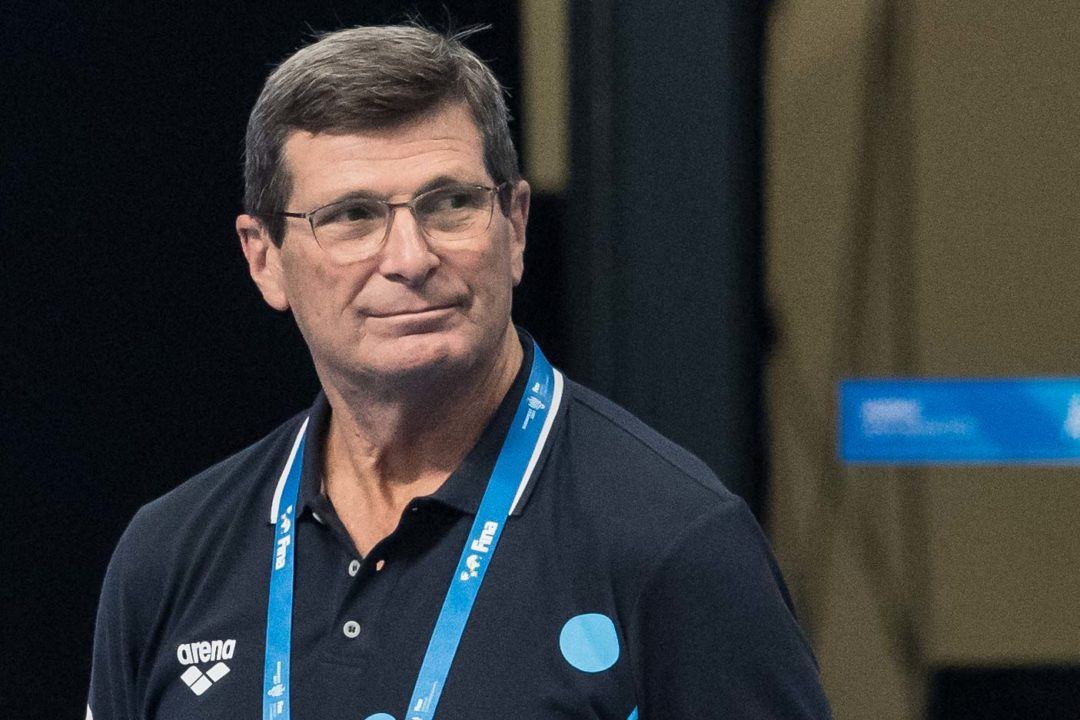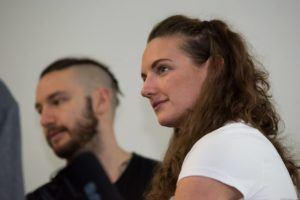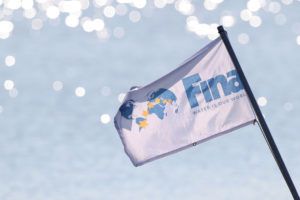Last week we published our first piece in a series of articles following an interview with FINA Vice President Dale Neuburger.
Let’s get this out of the way right now: SwimSwam reached out to Neuburger for interview. Neuburger was called out frequently for alleged conflicts of interest during Paolo Barelli‘s campaign for the FINA Presidency over the summer of 2017, and we recognize the importance of giving both sides of a story an equal voice.
The interview has been divided into three pieces not to give Neuburger additional “air time,” but because there was so much valuable material. Besides, a 6,000-word article is just more than SwimSwam readers are looking for (to the best of our knowledge).
OK, with that out of the way, here’s a quick recap of the FINA campaign and why we’re publishing this “series” in the first place:
- Italy’s Paolo Barelli begins his campaign for FINA President;
- Barelli claims the 81-year-old Julio Maglione of Uruguay is too old for re-election;
- Barelli names others unfit to sit the FINA Bureau, alleging scandal and conflict of interest;
- Barelli takes FINA before the Court of Arbtration of Sport (CAS) alleging conflicts of interest;
- CAS rules in FINA’s favor and charges are dismissed;
- Maglione defeats Barelli 258-77 at the FINA Congress in Budapest, winning his third-consecutive-term as FINA President (July 23, 2017).
The issues addressed in this article surround athlete participation in the governance of FINA. Now that the FINA/Airweave World Cup is back in action for the second cluster, it’s as good a time as any to remind readers of one of the summer’s hottest stories: The formation of a union known as the Global Association of Professional Swimmers, or GAPS. Led by Katinka Hosszu following radical changes made to the World Cup rules, specifically the introduction of event limits, GAPS will fight for greater athlete representation in the governance of aquatic sports.
SwimSwam: “Some members of the swimming community have been very frustrated lately because they feel they lack sufficient representation in FINA. The formation of the Global Association of Professional Swimmers (GAPS) led by Katinka Hosszu is probably the best example of athlete frustration… is FINA taking any steps to give athletes more of a voice, and get athletes more involved in decision-making?”
Dale Neuburger: “I think it’s really on two levels. The first level is the FINA level. The new Chairman of the FINA Athletes Commission is Penny Heynes, who was an Olympic Gold Medalist from South Africa, [and] attended and represented the University of Nebraska at the NCAA Championships, and is a leading voice within swimming, and respected worldwide. The Athletes Commission also includes Aaron Peirsol who will be serving his third term on the Athletes Commission…. There probably is not an athlete in my memory who is as popular among other athletes as Aaron Peirsol.”
“The Athletes Commission also includes Kirsty Coventry, who is the representative from Zimbabwe, and is a member of the International Olympic Committee, the IOC Athletes Commission. [She] attended Auburn University and [is] a multiple Olympic gold medalist. So [there’s] three examples: You have individuals who… have won multiple Olympic medals, who are respected worldwide for their accomplishments and their character, and also attended American universities. With Aaron Peirsol coming from Southern California, but also Penny Heynes from South Africa, and Kirsty [Coventry] coming from Zimbabwe.”
“I think in the next two years you will see a movement towards athletes electing athletes through athlete leadership positions within FINA, and I think that’s an important step.”
The full Athletes Committee includes:
| Name/Position | Country | Background | Name/Position | Country | Background |
| Penny Heyns, Chairman | South Africa | Swimming | Britta Kamrau, Vice Chairman | Germany | Open Water |
| Camelia Potec, Honorary Secretary | Romania | Swimming | Kirsty Coventry, Member | Zimbabwe | Swimming |
| Virginie Dedieu, Member | France | Synchro | Orlando Duque, Member | Colombia | High Diving |
| Malick Fall, Member | Senegal | Swimming | Aaron Feltham, Member | Canada | Water Polo |
| Stavroula Kozompoli, Member | Greece | Water Polo | Patrick Murphy, Member | Australia | Swimming |
| Aaron Peirsol, Member | United States | Swimming | Thiago Pereira, Member | Brazil | Swimming |
| Ryan Pini, Member | Papua New Guinea | Swimming | Tingmao Shi, Member | China | Diving |
| Kaori Takemura, Member | Japan | No Data | Matthew Dunn, Member | Australia | Swimming |
“I think the Athletes Commission under Penny’s leadership will be… very active and very engaged, and has already begun that process in Hungary.”
“The second level that needs a great deal of work is that, with 208 national federation members, there are very few member federations that have active athlete commissions in their domestic operations. In the United States we’ve had that as a result of the Amateur Sports Act of 1978. So for almost forty years, every decision-making body within our, all of our national governing bodies, 20% at the minimum must be athletes. For many federations around the world there is no athletes commission that operates domestically, and I think you will see a great emphasis by the FINA Athletes Commission to motivate new athlete commissions in member federations around the world, because that will also have a big impact on athlete representation and participation.”
“And, maybe thirdly… I think you will see… considerable movement in the athlete representation within FINA. One of those efforts will be to have athletes electing athletes, which is a fundamental principle, but has been difficult to administer in an equitable way. I think in the next two years you will see a movement towards athletes electing athletes through athlete leadership positions within FINA, and I think that’s an important step.”
SwimSwam: “That last part was very interesting, about athletes electing athletes. In the broad strokes, who are the athletes that are given that voice to, you know, which groups get to decide? Is it just those that have achieved a certain level of international success? Or is it decided by some other factor?”
Dale Neuburger: “Well… remembering that FINA represents at least six aquatic disciplines, including high diving. I’m not including among those disciplines Masters right now. But for the purpose of the athlete representations, swimming, diving, water polo, synchronized swimming, open water swimming, and high diving. So there are representatives on the FINA Athletes Commission representing each of those six disciplines, and that’s important. Additionally–I know you didn’t ask the question–but, additionally, the Coaches Commission has been expanded significantly to include at least four coaches from each of the six disciplines, [for] a total of 24 individuals now on the Coaches Commission to make sure that each discipline has adequate representation.”
“But I think, going back to the athletes… the conundrum of athlete representation is that many of the athletes who are most vocal are obviously those who are competing. However, it is very difficult for those competing athletes to also have roles in the governance simultaneously. It’s difficult from the time perspective, it’s difficult from conflict of interest issues… there’s always this important need and communication from the group of athletes who have recently retired, with those who are currently active and engaged in elite competition. And their needs, that dialogue is really important to make sure that current athletes are well represented, but also recognizing [that] it is challenging—very difficult—for current elite athletes with their schedules and their responsibilities, to also take on governance roles within FINA… within their own [federation].”
“If you look at USA Swimming and its athlete representation, there have been relatively few active National Team athletes who have been athlete representatives. So those representative need to maintain good dialogue. And to be honest, sometimes it can be excellent, [and] sometimes it could be improved.”
“So that’s the continuing challenge, I think, of athlete representation, is to allow those individuals who have achieved great success, and were involved in a sport for many years and want to give back something to it, to continue to have excellent communication and dialogue with current athletes, those who are trying to make their living from the sport right now, and are hoping for certain elements of the sport to to embrace their… their goals and their ambitions.”
“But it’s an ongoing and continuing process, and I think the current athlete leadership of FINA is absolutely committed to having that dialogue, to having good, ongoing dialogue with current elite athletes worldwide—not just in the United States, but certainly [with] athletes worldwide. And finding areas of congruence, consistency, and athlete goals and aspirations for our sport, and for FINA. But that’s not always easy, let’s say it that way.”
Sweet. So we’re about two-thirds the way through our “series” covering the “other side of the story.”
Well, there’s something we need to look at again in order to add more context to the two points recently expounded upon: Neuburger’s goals for the young quad and worldwide development in aquatics leading to the 2020 Olympic Games in Tokyo.
The following Q/A is actually borrowed from the first part of the interview. It’s (partially) restated here as it ties into athlete participation in FINA.
SwimSwam: “Do you have specific goals you would like to see achieved during this quad? What are you and FINA doing to make the international aquatics community better? What would you like to see FINA take forward through this next quad that will make the sport better?”
Dale Neuburger: “…I hope that [there] will be greater athlete participation, greater athlete engagement, in the governance process for FINA over the next four years. I think there is no single goal that is more important to the ongoing success of our sport and the organization than the vitality and the energy and the creativity that’s going to come from athletes who are… in the governance of FINA and the governance of our sport. So, I’m absolutely committed to working with athlete leadership both domestically and internationally to help those goals to be achieved.”
“…FINA now has significant financial reserves that are greater than they were five years ago—substantially greater than five years ago, for a lot of reasons. And now it’s time for us to use that money to invest in the sport. Invest in the future of the sport. So I will be very active in new programs, new initiatives, that are expensive, but also have the potential to transform our sport. To maintain our position as the number one Olympic sport, but also to transform our sport in a number of ways.”
“So, in summary: One is development, because, if you’re going to—our position is helped because we’re truly a global sport, not just a regional sport. So, the bigger our participation among qualified athletes worldwide, the better. Two, athlete representation and engagement. And three, new programs and initiatives to use our financial resources in FINA to transform the sport in a number of different ways.”
“…FINA now has significant financial reserves that are greater than they were…. And now it’s time for us to use that money to invest in the sport.”
OK, great. But you’re still skeptical? That’s understandable.
One thing that the aquatics community at large does not know is the precise strategy FINA will implement to achieve these goals. Barelli laid out his plan for FINA’s substantial reserves, and while not the FINA President, as a Vice President and member of the Executive Committee, he and Neuburger will have to work together towards this common cause.
In the document titled ActionFINA 2013-2017 (pages 194-207), FINA details where its monies have been spent since 2013 and to what ends these investments benefit the organization, and subsequently, the overall aquatics community–or so is the stated purpose. Though this document does not definitively state where FINA will allocate its “significant financial reserves” over the next four years, it does give some insight as to where monies are to be invested.
“Considering the expected growth of FINA’s activities over the next years and the difficulties encountered by the world’s economies, the target for next four-year period will be to assess the Federation’s financial structure and to protect its existence against unforeseen events or economic impacts. The consolidation of FINA’s financials will ensure that regular resources are available to support the different FINA projects.”
“As for financial aspects, our aim is to generate excess funds in order to invest in Aquatics activities worldwide and to secure the organization financial structure against any unexpected situation.”
“FINA managed to create a reserve for future Championships as an insurance to cover a draw back. At the end of the four-year period, funds were earmarked for the creation of an anti-doping foundation and for the Development and educational activities.”
“As a non-profit making association ruling under the Swiss law, FINA is deemed to redistribute its income. A glance on the financials shows that the excess of Income over expenditure at the end of this four-year period is mainly due to the IOC share of Television and Sponsorship rights received in relation with the Olympic Games.”
Surely doubts remain about Neuburger’s dedication to transparency, avoidance of conflicts of interest, and why FINA has not made him choose between service on the Executive Committee and his career with global sports marketing behemoth TSE Consulting SA–a topic in need of greater explanation itself (see page 4). Well, LOST may have gone off air seven years ago, but everyone still loves a good cliff-hanger. Tune in to part three for a detailed look at Neuburger’s concurrent service to FINA and his career in the world of sports.
(But since we don’t want to cause undue confusion or make readers unnecessarily suspicious of Neuburger’s time spent at both organizations, readers may access some of the literature he provided to us here, here, and here.)



The conflict of intetest is crystal clear. The other broader issue is this: just how representative is FINA of the swimming community? There are something like 200 FINA member nations and they all have an equal vote at FINA Congress – the supreme body. Yet about 80% of those nations do not really have elite swimming programs. The executive body, the FINA Bureau has 25 members with a President from Uruguay and other members from swimming powerhouses like Senegal, Fiji and Uganda. Look closely and you will see that most of the FINA Bureau come from countries that did not have one semi-finalist at the recent World Champtionships! It’s time to end the FINA gravy train for Dale Neuburger and… Read more »
Perhaps rethink ” And it’s about time the nations that actually provide the critical mass in world elite swimming e.g USA, Australia, Japan, Great Britain etc. actually ran the show.”. Other than US Swimming (and maybe JAP who are currently benefiting from Olympic investment); the bulk of the major swimming nations are frankly far more concentrated on their own economic survival and this is the case across the board with Olympic sports/those where Olympics are seen as the pinnacle of the sport.
Funding from public sector is reducing considerably (even GBR are finding that their National Lottery is no longer the fail-safe ‘cash cow’ it originally was) and commercial sponsorships are (1) scarce on the ground (2) in most cases… Read more »
Very nice piece, Braden.
How easy is it to spot FINA corruption? Look at their logo with the arching stars across a world map. Notice where the biggest star is? Uruguay, home of FINA’s octogenarian president. How many Olympiads has it been since Uruguay had an Olympic swimming finalist (let alone a semi-finalist)?
1. Is Neuberger a member of the FINA Executive Comittee?
2. Does Neuberger work for TSE consulting?
3. Does TSE get contracts from FINA?
Pick one or the either. This could not be a clearer case of conflict of interest corruption. I’m not a Barelli fan, but his point was valid. People like Neuberger are interested in financial gain so they don’t rock the boat with slimy Maglione. How hard did Neuberger protest Maglione changing the age limits so he could win a third term? How hard did Neuberger protest Russia and other governments insisting drug tainted athletes participate in the Olympics? How hard is Neuberger protesting for transparent financial disclosure? How hard is Neuberger protesting to clean… Read more »
If Neuberger could address his TSE commercial interests pursuant to FINA & explain why he believes it is not an overt conflict of interests, that’d be great.
C’mon, SwimSwam, be better than this. Don’t do a multi part series and fail to directly ask on this.
Joel – as you pointed out, this is a multi part series. Finish reading the series. Then decide what we’re “better than.” Patience is a virtue.